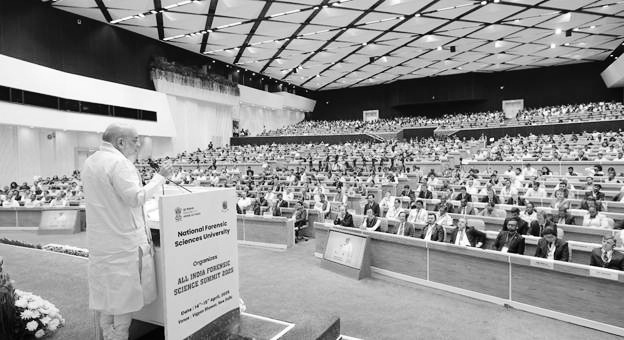Union Home Minister Amit Shah served as the Chief Guest at the All India Forensic Science Summit 2025 held in New Delhi. The summit, organized by the National Forensic Sciences University (NFSU), focused on the theme “Role of Forensic Science in Effective Implementation of New Criminal Laws and Combating Terrorism.” Esteemed attendees included Justice V Ramasubramanian, Attorney General Shri R Venkataramani, and others.
On the occasion of Dr. Bhimrao Ambedkar’s birth anniversary, Shri Shah honored his contributions to India’s Constitution, highlighting the extensive discussions and efforts that went into its formulation. He emphasized that the Constitution serves to protect citizens’ rights and noted the significant role of forensic science in enhancing the criminal justice system.
Amit Shah reiterated the government’s commitment to a more people-centric and scientifically driven justice system under Prime Minister Narendra Modi’s leadership. He emphasized the importance of timely justice and the government’s objectives of fostering a safe and competent India. To strengthen the criminal justice framework, he mentioned the introduction of three new laws: the Bharatiya Nyaya Sanhita (BNS), Bharatiya Nagarik Suraksha Sanhita (BNSS), and Bharatiya Sakshya Adhiniyam (BSA). The minister also referenced the historical significance of forensic science, which is rooted in texts like Charak Samhita and Kautilya’s Arthashashtra.
Amit Shah emphasized the crucial role of forensic science in delivering timely justice and improving conviction rates, noting how the nature of crime has evolved. Criminals now exploit advanced technology, making crime borderless—spanning cities, states, and countries. This shift underscores the increasing importance of forensic science. He pointed out the establishment of the National Forensic Sciences University, which was inspired by Prime Minister Modi during his tenure as Gujarat’s Chief Minister in 2009. The university, inaugurated on October 1, 2020, has become a trusted institution for forensic analysis and a hub for modernizing forensic laboratories nationwide.
Shah credited PM Modi’s leadership with transforming the criminal justice system, ensuring fairness for both the accused and complainants. He highlighted advancements in forensic education, producing skilled professionals and fostering research through diverse programs. Following PM Modi’s directive to eliminate colonial-era laws, significant work has been done to update India’s outdated legal framework. Shah asserted that the new criminal laws, crafted by Indians for the protection of Indian citizens, represent the most substantial legal reform of the 21st century. These laws aim to integrate modern technology and foresee future advancements, ensuring justice remains relevant and effective in contemporary society while discarding obsolete practices from the colonial past.
Union Home Minister Amit Shah announced significant reforms in the criminal justice system, introducing new laws that define e-documents and e-summons. He clarified that the technology used is secondary as long as these electronic formats are recognized legally, stressing the integration of technology throughout the criminal justice process—from crime scene to trial. Mandatory forensic investigations have been enacted for crimes punishable by over seven years, aiming to improve India’s conviction rate, currently at 54 percent, to the highest globally within the next decade.
Shah noted that terrorism is explicitly defined in the new laws, with provisions for including voice logs and digital recordings as admissible evidence. The laws include deadlines for police, prosecution, and judicial actions to ensure timely justice, leading to quick resolutions in cases such as a rapist convicted within 23 days.
Furthermore, he highlighted the complete digitization of police stations through the Crime and Criminal Tracking Network and System (CCTNS), which has made over 14 crore FIRs available online and equipped 22,000 courts with e-court facilities. Current advancements include 39 lakh forensic evidences accessible online and the integration of fingerprint data into the National Automated Fingerprint Identification System (NAFIS). Shah expects these technological improvements will aid in crime prevention and management through Artificial Intelligence in the coming years.
Union Home Minister highlighted the vision of PM Modi in establishing the National Forensic Sciences University (NFSU) in 2020. He noted that three new criminal laws are set to be implemented in 2024, reflecting a significant overhaul in the legal framework. Currently, seven NFSU campuses are operational across various states, with plans to add nine more within the next six months. Additionally, a proposal for the establishment of ten more campuses is under consideration. HM Shah emphasized the commitment to ensuring that every state in India will host an NFSU campus, aiming for comprehensive national coverage in forensic education. The goal is to develop each campus into a premier institution by specializing in distinct subjects, thereby enhancing the quality and effectiveness of forensic education and training. This systematic expansion of forensic sciences across the country reflects a strategic effort to bolster the legal and criminal justice system through advanced education and research in forensic science. The initiative seeks to equip students with cutting-edge knowledge and skills, contributing to the nation’s overall safety and security. The expansion of campuses will facilitate better access to forensic sciences, fostering a new generation of experts in the field dedicated to contributing positively to society.
